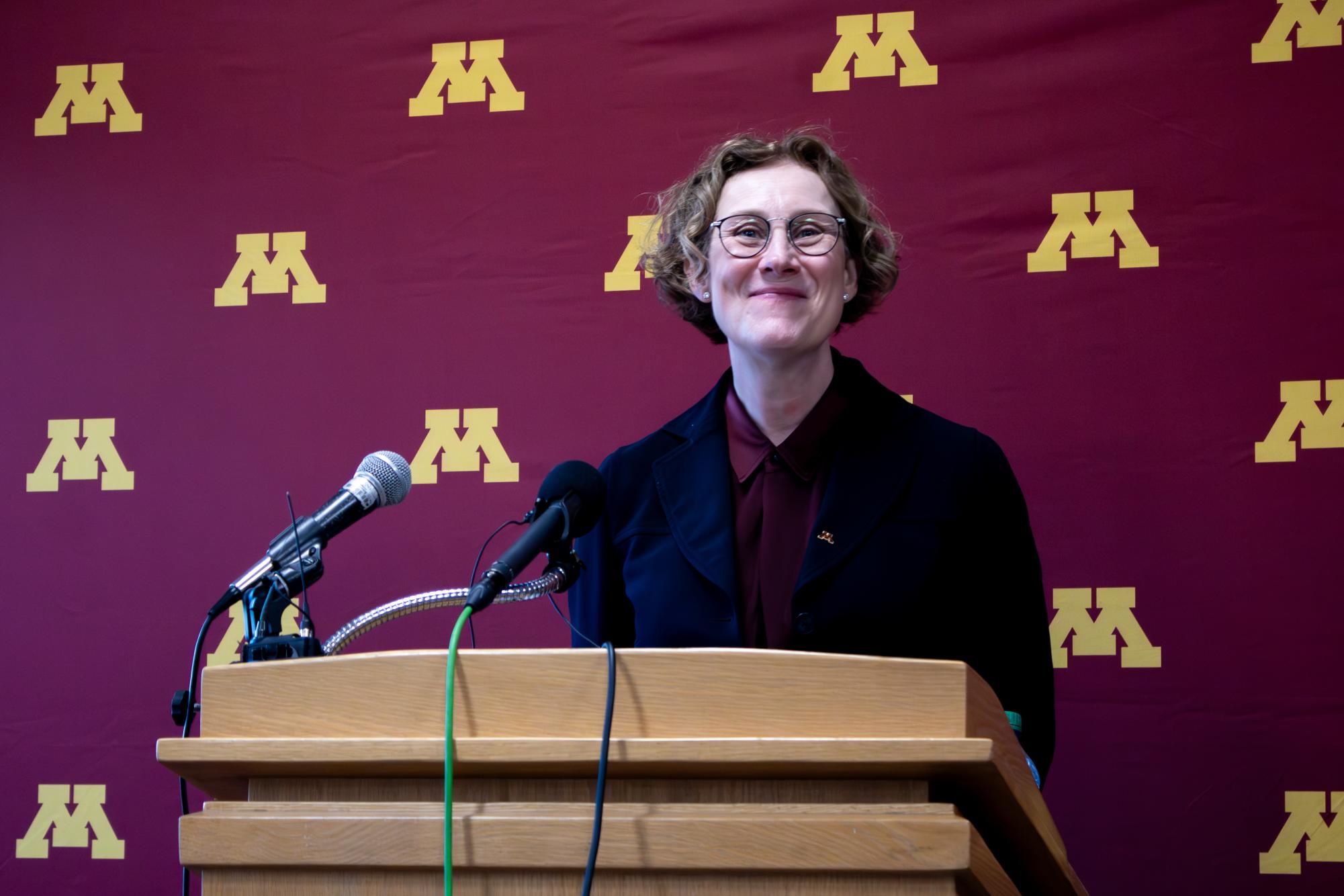BilldGopher
Section 211
- Joined
- Nov 12, 2008
- Messages
- 5,864
- Reaction score
- 4,680
- Points
- 113
The U is set to select the new President to replace Joan Gabel next week.
I know there are folks on this forum that thought "good riddance" with her departure but it was clear from very early on that she valued sports, especially revenue sports, as part of a major university's mission. Saw her several times over her tenure toodling around the stadium on gameday in a U cart fully decked in maroon and gold. She got it.
I've pulled the bios from this morning's Strib and see strengths in each candidate but nothing that makes me think they will give a hoot about UM sports. Hope I am wrong, otherwise it will fall on the Regents and the AD to make sure the UM does not backslide to the mentality of the 70s, 80s, and 90s that "undervalued" (to say the least) the importance of the revenue sports programs.
Some might say that whoever is President does not shape athletics at the UM. I would strongly disagree. I credit Mark Yudof for turning the UM ship of state to the course we are now enjoying today, especially for football. He was from UT Austin and was taken aback by what he saw here. There was open contempt for revenue sports at the top prior to his tenure.
Here's what the Strib put together:
She spent 30 years working in the system, including as a professor, executive director of the Center for Integrative Leadership, and most recently as dean of the Humphrey School of Public Affairs. During her time there, the school was ranked among the top 10 public affairs programs in the nation.
But her tenure wasn't without controversy. Some students wanted to see harsher punishments for two faculty members accused of sexual harassment. She had initially chosen to suspend them, saying her approach "was rooted both in clear accountability but also in restorative practices."
When regents formed a presidential search advisory committee in 2018 — for a search that eventually led to Joan Gabel's selection — they asked Bloomberg to serve as vice chair.
She said the transition presented a good opportunity for her to consider a career move as well: "The choice to leave is a hard one, but there were some things happening."
In 2021, she began working as provost at Cleveland State University, which has about 14,000 students. When the board decided to replace its president in 2022, it quickly tapped Bloomberg for the role.
"It was really based on her, what she demonstrated in the role of provost," said David Reynolds, chair of Cleveland State's Board of Trustees.
He said Bloomberg "was able to champion a few initiatives that we asked her to" while demonstrating humility and showing emotional intelligence.
Reynolds said she "has a knack for doing the tough things, and in a velvet hammer way."
"That moved our family out of poverty and was the best option we had," she said.
Cunningham attended a liberal arts school for her undergraduate studies and went on to earn a medical degree from Jefferson Medical College in Philadelphia. She completed her residency at the University of Michigan and spent more than 20 years working as an emergency room physician in the state.
During much of that time, she also worked as a professor and researcher, delving into topics like substance abuse and gun violence prevention. Marc Zimmerman, a professor at the University of Michigan and co-director of the Institute for Firearm Injury Prevention, credited her with helping to rebuild a critical research field that had languished after political debates stymied efforts to get funding.
"She's a thoughtful risk taker," he said. "She doesn't just sort of jump off a cliff. She has an idea."
Cunningham has been working since 2019 as the University of Michigan's vice president for research and innovation, overseeing a division that includes about 13,000 staff and faculty and reports about $1.8 billion in research expenditures.
Zimmerman said Cunningham has made changes to ensure their review processes run more efficiently and to encourage departments to collaborate in unexpected ways.
But he also said she showed a commitment to the community, working with groups in Flint, Mich., to ensure they had a voice in discussions when researchers around the country parachuted in to examine their water problems.
"She's well-rooted in her life," he said. "I think that humanity is what makes her so good at what she does."
Holloway also spent years working at the University of Michigan, where he worked as a professor and in 2007 began taking on higher administrative roles. He worked as an associate dean for undergraduate education and as a vice provost for programs focusing on global engagement and interdisciplinary learning.
During his time working there, Holloway visited the University of Minnesota while on work trips. "One of the things that super impresses me is the focus of the university on service to the state," he said.
In 2019, he left to become the provost and executive vice president for academic affairs at the University of New Mexico, a public research university that enrolls nearly 27,000 students spread across multiple campuses.
Paul Havern, chief of staff for the university's Graduate and Professional Student Association, said Holloway asked to set up monthly meetings with them, a rare request from a high-level administrator.
When the association asked for help tackling campus safety issues, Havern said Holloway followed up — and also provided students with guidance on who else they should be contacting about their requests.
"I feel like people are drawn to expressing their concerns to him because he is so receptive to people," Havern said. "He will tell you 'no' when something is impossible, but he will explore every possibility that exists in a reasonable world before he tells you. He is a straight shooter in that way."
I know there are folks on this forum that thought "good riddance" with her departure but it was clear from very early on that she valued sports, especially revenue sports, as part of a major university's mission. Saw her several times over her tenure toodling around the stadium on gameday in a U cart fully decked in maroon and gold. She got it.
I've pulled the bios from this morning's Strib and see strengths in each candidate but nothing that makes me think they will give a hoot about UM sports. Hope I am wrong, otherwise it will fall on the Regents and the AD to make sure the UM does not backslide to the mentality of the 70s, 80s, and 90s that "undervalued" (to say the least) the importance of the revenue sports programs.
Some might say that whoever is President does not shape athletics at the UM. I would strongly disagree. I credit Mark Yudof for turning the UM ship of state to the course we are now enjoying today, especially for football. He was from UT Austin and was taken aback by what he saw here. There was open contempt for revenue sports at the top prior to his tenure.
Here's what the Strib put together:
Laura Bloomberg
Bloomberg earned her Ph.D. in educational policy and administration at the U, at one point studying under Robert Bruininks, who worked as U president from 2002 to 2010.She spent 30 years working in the system, including as a professor, executive director of the Center for Integrative Leadership, and most recently as dean of the Humphrey School of Public Affairs. During her time there, the school was ranked among the top 10 public affairs programs in the nation.
But her tenure wasn't without controversy. Some students wanted to see harsher punishments for two faculty members accused of sexual harassment. She had initially chosen to suspend them, saying her approach "was rooted both in clear accountability but also in restorative practices."
When regents formed a presidential search advisory committee in 2018 — for a search that eventually led to Joan Gabel's selection — they asked Bloomberg to serve as vice chair.
She said the transition presented a good opportunity for her to consider a career move as well: "The choice to leave is a hard one, but there were some things happening."
In 2021, she began working as provost at Cleveland State University, which has about 14,000 students. When the board decided to replace its president in 2022, it quickly tapped Bloomberg for the role.
"It was really based on her, what she demonstrated in the role of provost," said David Reynolds, chair of Cleveland State's Board of Trustees.
He said Bloomberg "was able to champion a few initiatives that we asked her to" while demonstrating humility and showing emotional intelligence.
Reynolds said she "has a knack for doing the tough things, and in a velvet hammer way."
Rebecca Cunningham
Cunningham got her first glimpse at higher education when she was 7 years old and joined her mother — a single parent working two jobs — for night classes."That moved our family out of poverty and was the best option we had," she said.
Cunningham attended a liberal arts school for her undergraduate studies and went on to earn a medical degree from Jefferson Medical College in Philadelphia. She completed her residency at the University of Michigan and spent more than 20 years working as an emergency room physician in the state.
During much of that time, she also worked as a professor and researcher, delving into topics like substance abuse and gun violence prevention. Marc Zimmerman, a professor at the University of Michigan and co-director of the Institute for Firearm Injury Prevention, credited her with helping to rebuild a critical research field that had languished after political debates stymied efforts to get funding.
"She's a thoughtful risk taker," he said. "She doesn't just sort of jump off a cliff. She has an idea."
Cunningham has been working since 2019 as the University of Michigan's vice president for research and innovation, overseeing a division that includes about 13,000 staff and faculty and reports about $1.8 billion in research expenditures.
Zimmerman said Cunningham has made changes to ensure their review processes run more efficiently and to encourage departments to collaborate in unexpected ways.
But he also said she showed a commitment to the community, working with groups in Flint, Mich., to ensure they had a voice in discussions when researchers around the country parachuted in to examine their water problems.
"She's well-rooted in her life," he said. "I think that humanity is what makes her so good at what she does."
James Holloway
Holloway was drawn to nuclear engineering, earning his Ph.D. in engineering physics from the University of Virginia. His research has focused on topics like nuclear reactor physics, applied mathematical analysis, and technology development.Holloway also spent years working at the University of Michigan, where he worked as a professor and in 2007 began taking on higher administrative roles. He worked as an associate dean for undergraduate education and as a vice provost for programs focusing on global engagement and interdisciplinary learning.
During his time working there, Holloway visited the University of Minnesota while on work trips. "One of the things that super impresses me is the focus of the university on service to the state," he said.
In 2019, he left to become the provost and executive vice president for academic affairs at the University of New Mexico, a public research university that enrolls nearly 27,000 students spread across multiple campuses.
Paul Havern, chief of staff for the university's Graduate and Professional Student Association, said Holloway asked to set up monthly meetings with them, a rare request from a high-level administrator.
When the association asked for help tackling campus safety issues, Havern said Holloway followed up — and also provided students with guidance on who else they should be contacting about their requests.
"I feel like people are drawn to expressing their concerns to him because he is so receptive to people," Havern said. "He will tell you 'no' when something is impossible, but he will explore every possibility that exists in a reasonable world before he tells you. He is a straight shooter in that way."





